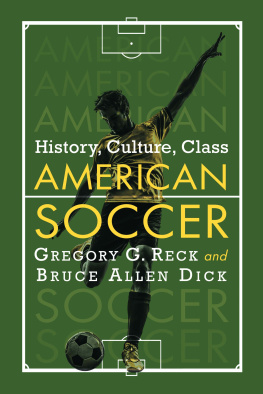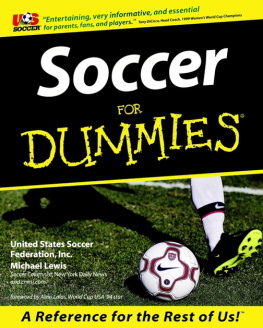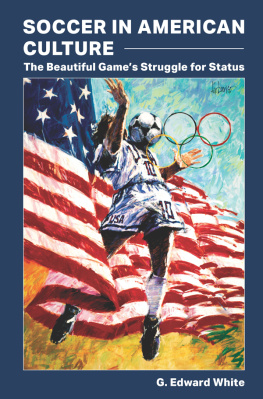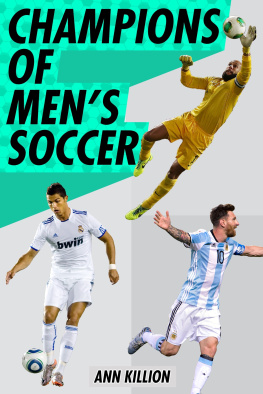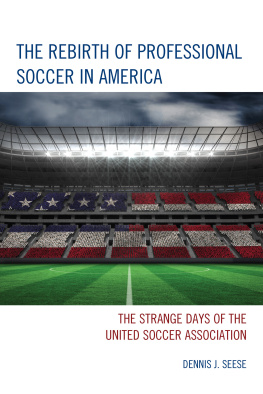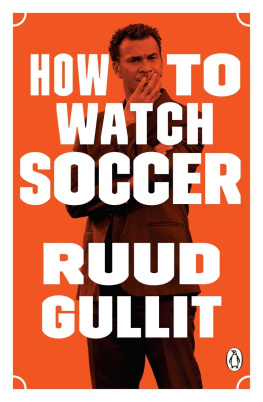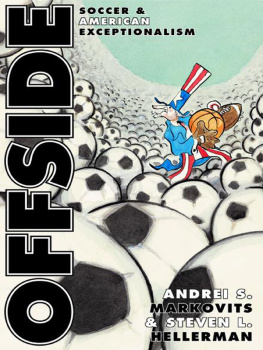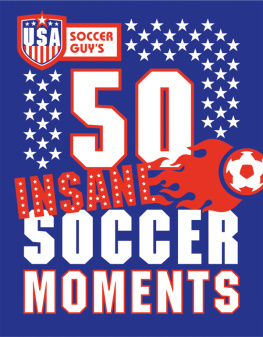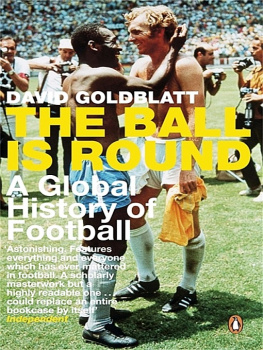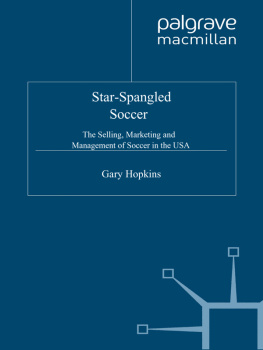
American Soccer
History, Culture, Class
Gregory G. Reck and
Bruce Allen Dick

McFarland & Company, Inc., Publishers
Jefferson, North Carolina
LIBRARY OF CONGRESS CATALOGUING DATA ARE AVAILABLE
BRITISH LIBRARY CATALOGUING DATA ARE AVAILABLE
e-ISBN: 978-1-4766-1756-5
2015 Gregory G. Reck and Bruce Allen Dick. All rights reserved
No part of this book may be reproduced or transmitted in any form or by any means, electronic or mechanical, including photocopying or recording, or by any information storage and retrieval system, without permission in writing from the publisher.
Cover image 2015 Ostill/iStockphoto
McFarland & Company, Inc., Publishers
Box 611, Jefferson, North Carolina 28640
www.mcfarlandpub.com
For Gabriella, Melanie, Julien,
Ahana, Annie, Ava, and Beau
Acknowledgments
First and foremost, we want to thank our good friend and colleague, Andrs Fisher, for helping us coach our daughters soccer team for three years and for teaching us the intricacies of the game of soccer. His knowledge and passion for the sport are contagious. We hope this book reflects his friendship and valuable insights.
We also want to thank V. Kemp Jones from Athens, Georgia, who provided an original soundtrack for our documentary video on youth soccer, Offside(s): Soccer in Small-Town America. Kemp also read chapters of this book and provided valuable suggestions on how to improve the manuscript.
The contributions of other authors made this book possible. In particular, wed like to thank Roger Allaway, Colin Jose, David Litterer, and David Wangerin for their dedication to keeping soccer history alive. Wed also like to thank author Paul Cuadros for his support over the years and for the information he provides in his writings about Latino soccer in North Carolina.
Appalachian State University supported this project in numerous ways. We want to thank ASUs past and present soccer coaching staff for both providing archival material and granting interviews for our chapter on Appalachian soccer. In particular, wed like to thank Vaughn Christian, Hank Steinbrecher, Art Rex, Paul Stahlschmidt, Ben Popoola, and Matthew Nelson for their support. Steve DeGroat also supplied biographical material for his father, Eric DeGroat, ASUs first varsity mens soccer coach. Jim Jones, retired athletic director, likewise provided valuable information on the early years of ASU soccer. And we never could have written the ASU chapter without the information provided by Emmanuel Ike Udogu and Thompson Usiyan, Appalachian stars from the 1970s.
The technical assistance we received from Appalachian was invaluable. Jeremy Wright formatted our documentary and parts of this book. A former North Carolina soccer player, he also gave us insight into the club soccer experience. Tom McDonnell, computer technologist in ASUs College of Arts and Sciences, provided support from the very beginning. Gabrielle Motta-Passajou also lent her technical skills for both the documentary and the book, as did Edison Midgett from the Department of Art. Working with two technological dinosaurs, these faculty and staff members taught us the difference between My Documents and My Computer.
We also need to thank ASUs library staff, especially John Boyd and Beth Cramer, for their continuous support. Other colleagues in the university and friends in the larger soccer community provided assistance and encouragement. Wed especially like to thank Jeff Boyer, Tom Whyte, Diane Mines, Leon Lewis, Tom McLaughlin, Mark Vogel, Jim Fogelquist, Carl Eby, Leslie Cook, Alfredo Alvarez, Gabriel Raeburn, Don Porterfield, Lucas Clary, and our brothers. In addition, the College of Arts and Sciences and ASUs Hubbard Center provided financial assistance along the way. Conversations with numerous other faculty, staff, students and friends likewise should not go unnoticed.
Finally, we thank our childrenMelanie, Julien, Ahana, Annie and Ava (and Lucia, Andrss daughter)whose years of playing soccer inspired us to write this book. They were especially gracious for tolerating their fathers as coaches. Thanks also go to the other girls (and their parents) whom we coached over the years. They added humor and humanity to that chapter of our lives.
Preface
American Soccer: History, Culture, Class offers a unique critical and historical overview of American soccer from its working-class origins in the 1880s to the present. It also provides a participatory perspective on the sport, including a chapter on our own three-year involvement as coaches of youth soccer in the Appalachian community of Boone, North Carolina, where we live, as well as local case studies of university and Latino soccer.
While there are books on particular historical soccer moments and a number of treatises written by soccer enthusiasts on esoteric soccer subjects, as well as websites with soccer statistics and minutia, there are no other books that we know of that conflate all of this material inside a single cover, especially one that brings a critical cultural studies perspective to the sport. Our book is not just a historical summary of the past and present U.S. soccer landscape but also a narrative with an accessible viewpoint that addresses the central issue of the socioeconomic space occupied by U.S. soccer. The history of soccer in the United States is informative in itself, but its real purpose in this book is to demonstrate a stark contrast with the socioeconomic space occupied by soccer in the United States today. The sections on contemporary soccer cover that landscapefrom its beginnings in relatively informal Parks and Recreation leagues through more formal club soccer programs, university soccer, professional soccer, and U.S. national teams.
We became interested in the cultural landscape of American soccer after we coached our daughters in a county Parks and Recreation youth soccer league. That experience led to a documentary video titled Offside(s): Soccer in Small-Town America, which examines five local soccer venues in our small, mountainous community. The feedback we received after screening the video at film festivals and professional conferences convinced us that our own story as coaches and related soccer experiences were tied to multiple threads of soccer on other levels around the country. This book explores those links.
Because our book is a comprehensive overview of both the past and present cultural landscape of U.S. soccer, the most important similar texts in print include two books by David Wangerin: Soccer in a Football World: The Story of Americas Forgotten Game (2006) and Distant Corners: American Soccers History of Missed Opportunities and Lost Causes (2011). Our book differs from those of Wangerin in several ways, however. Wangerins texts focus almost exclusively on the history of male national teams and professional leagues. While our book overlaps in some of the history of U.S. soccer Wangerin outlines in his work, it adopts a much broader examination of the total past and present landscape of U.S. soccer and includes material on the relatively recent development of womens soccer, the origins and development of youth soccer, the alternative narrative of Hispanic soccer leagues in the United States, and historical and contemporary material on national and professional soccer. Our book does not present itself as a history of the highest levels of soccer in the United States, but rather as a broad overview of soccers past and present that includes material not present in Wangerins work.
Next page
